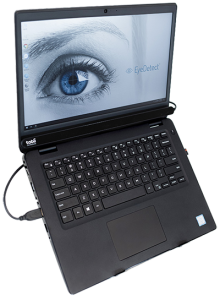No More Hiding Those Lyin’ Eyes with EyeDetect
EyeDetect uses involuntary eye behavior data collected while taking an automated computerized test to determine if a person is lying. It’s 86-91% accurate and is currently used by more than 600 customers in 60 countries.

A new eye-monitoring lie detection technology called EyeDetect is a new method for detecting deception. This automated computer test is up to 91% accurate in determining if a person is lying.
LEHI, Utah – Jan. 19, 2024 – Since 1921, the world’s de facto lie detector has been polygraph. It wasn’t until 2014 that another accurate, scientifically validated and completely new method for detecting deception was introduced.
Instead of measuring physiological changes in one’s body (such as blood pressure, heart rate and perspiration) like polygraph, EyeDetect by Converus is an automated computerized test that measures changes in involuntary eye behavior — including pupil dilation, blink rate, and other eye movements — while the test taker answers a series of true/false or yes/no questions. The test takes 15-45 minutes depending on the test protocol used and results are available in less than five minutes.
In comparison, the average polygraph takes at least 90 minutes and results can take several hours.
“Yes, it’s now possible to tell lies from the eyes with a more advanced, user-friendly, more affordable lie detection technology,” said Converus President and CEO Todd Mickelsen. “EyeDetect is a very different type of lie detector. No cables or sensors are attached to the examinee. It’s noninvasive.”
The concept for this technology was first conceived in the summer of 2002 by two University of Utah scientists: Dr. John Kircher, a noted polygraph expert also credited with co-inventing the computerized polygraph, and his colleague Dr. Doug Hacker, an educational psychologist with expertise in writing and reading comprehension processes. Kircher and Hacker began researching the new concept in their lab and three other scientists with additional expertise in eye-tracking equipment, test construction, and criminal investigations joined the effort.
It took this science team more than a decade to conduct research, test and retest the concept, develop a protocol and refine the computer algorithms able to support their hypothesis beyond a reasonable doubt — deception can be accurately detected from a person’s involuntary eye behavior.
Over the years, EyeDetect’s accuracy has been scientifically validated by numerous peer-reviewed research studies.
“Since the test is automated, the potential for human bias is almost eliminated,” said Mickelsen. “At the conclusion of a test, the data are uploaded to a secure cloud server and analyzed by computer algorithms. In less than five minutes, the person is scored as either credible or deceptive. It’s impossible for this test to discriminate against anyone.”
Mickelsen says their primary customers include government, law enforcement and private sector companies that use the product to screen potential hires, monitor existing employees and carry out investigations. U.S. federal law prohibits the use of lie detectors for employment-related testing within private companies; however, U.S. federal, state, and municipal government employees or contractors are allowed. Because of this law, U.S. customers include attorneys and private investigators — as well as those that test sex offenders for parole, probation or therapy program violations. In addition, lie detectors can be used in criminal or civil cases, addiction therapy, drug testing, iron man and body building competitions, and fishing tournaments. EyeDetect even helped exonerate an Olympian pole vaulter of doping accusations.
In 2023, Converus released VerifEye — a mobile app version using the same proven science, testing protocols and underlying technology. The only difference between EyeDetect and VerifEye is the hardware used to capture and process the involuntary eye changes.
EyeDetect is currently used by more than 600 customers in 60 countries in 50 different languages to screen potential and existing employees for involvement in drug use, robbery, sexual assault, infidelity, murder, sabotage, espionage, terrorism and other criminal and unethical behaviors. Customers include 90 U.S. law enforcement agencies.
For more information, visit: converus.com
# # #
About Converus®
Converus provides scientifically validated credibility assessment technologies. VerifEye™ is the world’s first mobile app to help organizations or individuals accurately verify the truth about a person — including background, identity, creditworthiness and claims — in about 10 minutes. EyeDetect®, which detects deception by measuring involuntary eye behavior, is a fast, accurate, affordable, noncontact, scalable, and fully automated option to polygraph. EyeDetect+ is the world’s first automated polygraph, making the testing process impartial, accurate, and less intrusive (than a traditional polygraph). It assesses credibility by monitoring and recording ocular activity plus physiological activity similar to a traditional polygraph. Customers worldwide use the EyeDetect product line for screening and investigations to help protect countries, corporations and communities from corruption, crime and threats. Converus is headquartered in Lehi, Utah, USA. Visit converus.com
______________________________________________________________________
Press Contact: Jeff Pizzino, APR (+1 480-606-8292 or [email protected])

